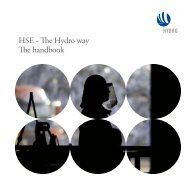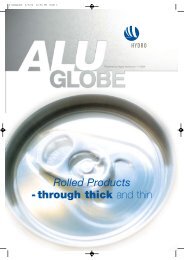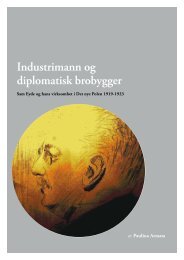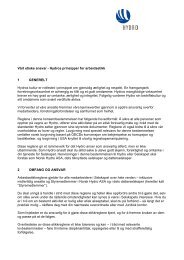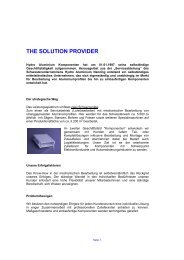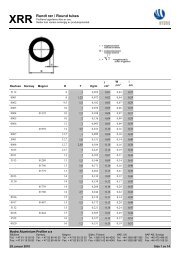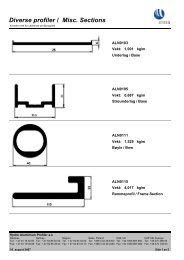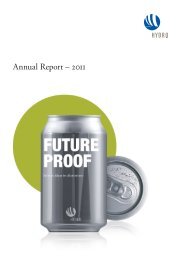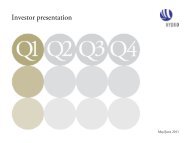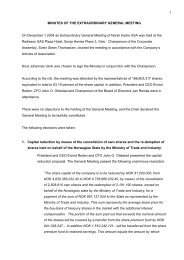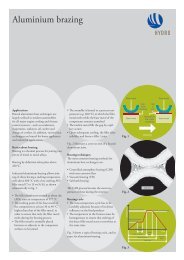Create successful ePaper yourself
Turn your PDF publications into a flip-book with our unique Google optimized e-Paper software.
The size of the Chinese market for alumin-<br />
ium building products is not that easy to<br />
gauge. Lugrin estimates a volume of roughly<br />
1 million tonnes per year for the type of pro-<br />
ducts that <strong>Hydro</strong> supplies. <strong>Hydro</strong> Building<br />
Systems’ niche in this market is probably<br />
around 100,000 tonnes.<br />
But they are not alone. Both European<br />
and Chinese suppliers are chasing shares<br />
in the market for top-quality products. More-<br />
over, the Chinese authorities are about to<br />
introduce stringent new requirements con-<br />
cerning the energy efficiency of buildings.<br />
“The new specifications outlined are<br />
intended to improve the energy efficiency of<br />
new buildings by 65 per cent,” he explains.<br />
“They will be more stringent than the most<br />
rigorous specifications in Europe.<br />
“This represents a great opportunity for us,<br />
but it also means that Chinese producers will<br />
soon catch up in this field. Several of them<br />
already deliver very advanced building systems.<br />
If we intend to keep ahead in terms of quality<br />
and technically advanced solutions, we need<br />
to intensify our product development efforts.<br />
Our most demanding clients in China do not<br />
set lower standards than our European ones.”<br />
Lugrin and his team are off to a flying start,<br />
but they know that a large and growing market<br />
Personal profile<br />
Gérard Lugrin – ‘pioneer’<br />
Gérard Lugrin has been <strong>Hydro</strong> Building Systems’ representative in Beijing for one year,<br />
but he is no industry newcomer. The 59-year-old French architect has spent his entire<br />
career in the aluminium industry, most of it with Technal, which became part of <strong>Hydro</strong><br />
in 2002. He has lived all over the world – in Morocco, Thailand, Europe and the Middle<br />
East. and traveled for 15 years in Africa, Middle East and South America. Lugrin came<br />
to Beijing from Bahrain. He describes himself as a typical pioneer. That’s what he likes<br />
doing best – setting up, building, getting the wheels to turn. Afterwards he prefers to<br />
withdraw and hand over to the locals. This is clearly the right thing to do in China.<br />
is not in itself a guarantee of success. You also<br />
need a real ability and willingness to under-<br />
stand where you naturally fit in Chinese culture.<br />
Gérard Lugrin is enthusiastic – and there can<br />
be no doubt that his people are too. He says<br />
that he faces the tasks confronting him with<br />
due humility. Moreover, he is greatly impressed<br />
by the tempo and determination in today’s<br />
developing China.<br />
“Just look around! There’s hardly a block in<br />
this huge city that isn’t dominated by several<br />
big cranes. New skyscrapers are going up all<br />
over the place. There are market opportunities<br />
as far as the eye can see,” he says. “This is<br />
tremendous. I’ve never experienced anything<br />
like it.”<br />
hi! > Ole Johan Sagafos<br />
photos > Ole Walter Jacobsen<br />
Preparations are under way<br />
for the 2008 Olympics in Beijing.<br />
hi! 13



